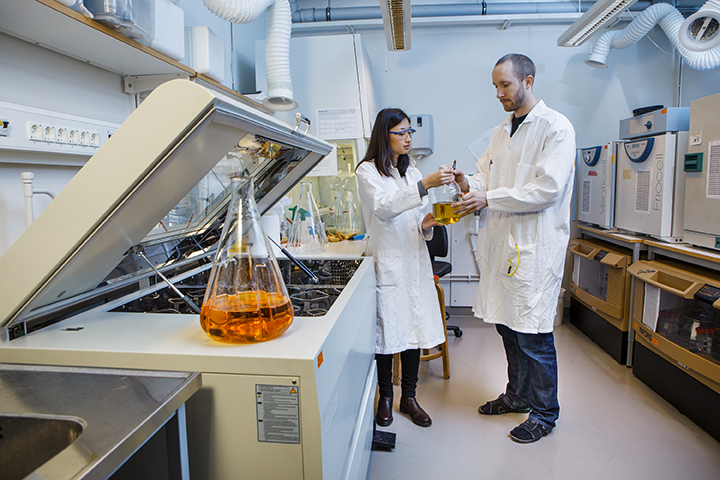Global recruitment seeks top researchers

KTH Royal Institute of Technology is offering 13 international researchers positions as assistant professors. Here's a quick look at the positions that come with a four-year startup grant.
"We are looking for promising young scientists around the world who want to establish themselves here, says Peter Gudmundson, President of KTH.
The posts of associate professor will be filled in , from mathematics to sustainable urban development. "It will be up to those who come in to shape the profile that each research area should have," Gudmundson says.
The 13 researchers who get the jobs will receive a start-up grant for four years and then they can qualify for a professorship. They and their spouses and families will also receive assistance with housing and immigration issues.
KTH's efforts to create a more gender-balanced faculty will also be affect the recruiting.
"Our wish is to have a gender balance among the applicants, 50-50. But if we do not reach that target, it is an absolute must that we reach a level of one-third women. Basically, it is our teachers, researchers and students that determine the quality of KTH Royal Institute of Technology, he says.
The available research positions are:
In this broad subject area, the researcher will aim to understand, explain and enable broad societal transformation for sustainable urban development. Technological, ecological, environmental, social, cultural, historical, economical, ethical and political dimensions should be integrated and complex forms of co-operation, governance and competition should be considered. The subject fiel d entails analysis of what sustainable urban development has been, what it can be and how it can be realised.
Concerns methods, theory and tools to build systems with cognitive, social, and communicative skills for interaction and co-operation with humans. Important applications are found in such areas as manufacturing industry, health care and rehabilitation, education, and in novel sensor-informed social media and mobile artifacts.
This subject field comprises method development and application of massively parallel DNA sequencing of the human genome in combination with targeted functional and mechanistic experiments with the purpose to map and predict the function of genetic variants found in the human genome. The key aim is to facilitate identification and interpretation of genetic variants to improve diagnostics of genetic disease and enable individualized treatment.
This area is comprised of three main parts: (1.) methods, algorithms, theory and tools to collect, process, and analyze large data volumes; (2.) data-intensive research based on simulations or data from sensors; and (3.) research on computer science infrastructure targeting large-scale data.
This area involves engineered systems formed by the multidisciplinary and systematic integration of biological and electrical functionalities, via physical and communication interfaces. The subject includes modeling, analysis, synthesis, implementation and testing of both the electrical and the biological aspects of such hybrid systems.
This subject encompasses design, analysis, tools and methods for the development of software for software intensive systems.
This subject has particular emphasis on the development of novel X-ray Technology and/or methods. The scientific and technological focus should concern Astrophysics, Materials Physics or Medical-/bio-imaging. The subject concerns experimental activities, preferably including also theoretical aspects.
This subject should be interpreted in a broad sense and may include fundamental mathematical research, as well as applied mathematics and computational mathematics. Example of areas are nonlinear problems including dynamical systems and partial differential equations and related stochastic models, many-particle systems and statistical mechanics, graph theory and networks, multiscale problems including numerical methods, stochastic geometry, optimization of systems, analysis of and statistics for big data sets.
Comprises process technology with focus on recycling of resources from waste. The subject area is interdisciplinary with strong emphasis on chemical and biological processes. The subject area has a strong experimental as well as theoretical character, where mathematical modeling at different levels of scale is required to describe, optimize and dimension basic unit operations, equipment and processes.
This area includes systematic analyses of technological innovations with significant environmental and economic impact, emphasizing the recycling of products as well as distribution and consumption in industrial systems. The technical part of the research will be based on thermodynamic and kinetic studies of processes as well as on properties of metals, slags and gases and how this knowledge can be utilized to create new multipurpose environmentally conductive innovations. The economical part of the research addresses new business and ownership models for producers of products and services related to enabling an improved management of resources.
Includes systems-oriented engineering design research leading towards an industrial change in how products and manufacturing systems are designed such that the product related prerequisites for a circular manufacturing industry are fulfilled. This may include how innovative product development is organized as well as how products are designed and optimized to enable circularity and multiple life cycles. The subject also includes how future manufacturing and remanufacturing systems can be designed.
The funding for each position makes it possible for the recruits to get a stable economic- and research-based platform, Gudmunson says. "In time we will definitely be able to recoup it.
"We would hope that they settle here, are successful and that their research has a great impact in the long term, Gudmundson, says, noting that KTH, its research and networks and Stockholm have strong appeal abroad.
Edited by David Callahan